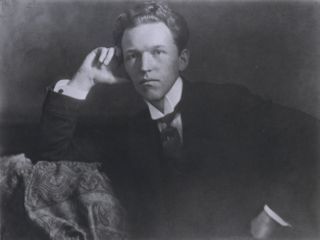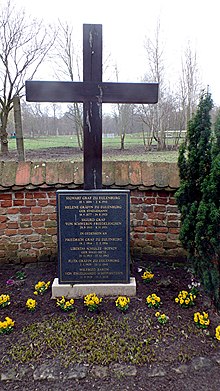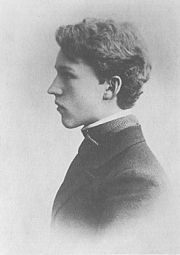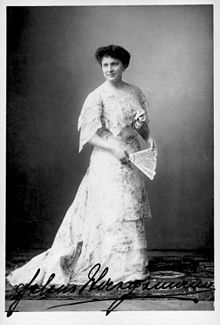Botho Sigwart zu Eulenburg
Sigwart Botho Philipp August zu Eulenburg Graf zu Eulenburg (born January 10, 1884 in Munich , † June 2, 1915 in Jasło ) was a German composer of the late Romantic period .
Life
Sigwart Graf zu Eulenburg was the second son of Philipp zu Eulenburg (1847–1921) and Augusta Freiin v. Sandels (1853-1941). The future Prince Philipp zu Eulenburg-Hertefeld was also artistically inclined and active as a composer, poet and writer. He promoted the talent of his son vigorously, so that Sigwart zu Eulenburg grew up in his father's castle Liebenberg in a musical environment.
Childhood and school days
Botho Sigwart, a designation that he gave himself as an artist name in later years, received his first musical training with Graf Spork from 1891 to 1894. At the age of seven he began to write songs by ear and his own composition and soon developed a perfect gift for Improvisation on the piano. From 1895 to 1898 he was taught by Gound in Vienna and from 1898 learned to play the organ at the grammar school in Bunzlau (Silesia) with the city cantor Wagner, so that he was occasionally allowed to make musical arrangements for church services. During this time he published his first collection of songs, which he wrote at the age of twelve, as well as a composition for orchestra composed at the same age, which was premiered in the Musikvereinssaal in Vienna. In 1899 he left Bunzlau and returned to Liebenberg in order to finally complete his Abitur at the Friedrich-Wilhelm-Gymnasium in Berlin after private lessons by Hans Mayr, who was known in Bavaria and an excursion to the Luitpold-Gymnasium in Munich .
Studies and PhD
Eulenburg studied history and philosophy in Munich from 1902. At the same time he completed contrapuntal studies with Professor Ludwig Thuille and orchestral studies with Hofkapellmeister Hermann Zumpe . He lost both teachers through their untimely death. Botho Sigwart spent the semester break in his home town of Liebenberg, while his enthusiasm for nature kept him traveling. At the invitation of Cosima Wagner , he also spent a summer in Bayreuth, where he had access to all festival rehearsals. Botho Sigwart received his doctorate with a thesis on the Rothenburg composer and organist Erasmus Widman (1572–1634) and spent several months in Rothenburg odT until he completed his studies as Dr. phil. finally completed.
Training at Reger and Hochzeit
Eulenburg turned down an offer as Kapellmeister in Colmar and took up residence in his native Liebenberg again. He set up the "Lindenhaus" in his father's park so that he could pursue his compositional work in peace. Nevertheless, he continued his two-year studies with Max Reger in Leipzig every week . He tormented himself with the work on fugues that he had already encountered at Widman and wrote to his godfather and mentor Cuno Graf Moltke: “The fugue is an artistic creation and you can write beautiful music in the fugue, but it is but a real slavery for the imaginative person. "His teacher Reger, who was nevertheless very impressed by Botho Sigwart's fugues, replied to this objection, which was also presented to him:" If you will have written 300 fugues like me, then you will find yourself in you can move freely, as in any other form. "
In the meantime, Botho Sigwart had met the chamber singer Helene Staegemann (1877–1923) in Leipzig . She was the daughter of the general manager of the city theater in Leipzig, Max Staegemann and his wife, the violinist Hildegard Kirchner. Helene's grandmother, Mathilde Staegemann, came from the well-known artist family Devrient and was the sister of the celebrated actors Karl , Emil and Eduard Devrient ; Helene's brother was the successful opera singer and actor Waldemar Staegemann (1879–1958). After completing her vocal training with her father, Helene Staegemann performed as an established artist in Berlin, Vienna and Prague and was celebrated as a concert soprano. She was considered an excellent song interpreter. Composers such as Carl Reinecke and Hans Pfitzner dedicated their own song compositions to her. Sigwart and Helene married on September 21, 1909 in Leipzig.
Organ instruction by Albert Schweitzer
The young couple took up quarters in the "Weisses Hirsch" at Lorenzstrasse 4 in Dresden and was often out and about due to Helene's many engagements. Also in the villa of the then famous doctor and patron Professor Dr. Albert Neisser in Breslau met the two of them with an audience interested in music. Sigwart's godfather, Count Cuno Moltke, witnessed an unplanned vocal performance by Botho Sigwart. His godson was not trained as a singer, but he apparently made such a fundamental impact that the audience sobbed and the hosts in tears. Moltke later wrote: "The soul spoke to you immediately". He perfected his compositional work on the organ, an instrument that Botho Sigwart had always valued particularly, in 1911 with further instruction from Albert Schweitzer , whom he visited for a long time in Strasbourg. Botho Sigwart dedicated a large organ concerto (op. 12) to him, which was already scheduled for performance in Strasbourg, but this was not done due to Albert Schweitzer's unexpected illness.
Greece trip and opera "The Songs of Euripides"
From May 1911, Sigwart and Helene undertook a long trip to Greece, which took them to the most famous shrines in the country. In the bay of Eleusis, the two met the location of the villa of Euripides in Salamis and were deeply impressed by the Acropolis of Athens, Delphi and Sunion. Botho Sigwart recorded his experiences in a detailed diary, which he comprehensively processed musically after his return: The melodrama for orchestra, "Hector's Bestattung" (based on the words of Homer's Iliad) (op. 15), was shown with great success in the Leipzig Gewandhaus , later also performed in Dresden and Leipzig, and prompted Arthur Nikisch (1855-1922), director of the Leipzig Conservatory and conductor of the Gewandhaus Orchestra, to order a symphony for orchestra from Sigwart. But Botho Sigwart had been thinking of an opera for years. This is how the work “The Songs of Euripides” came about, the texts of which his teacher, Count Sporck, had already drawn his attention to at the time. Botho Sigwart withdrew for a few months in 1912 and 1913 into the solitude of his father's house, Hertefeld, on the Lower Rhine. During the composition he was already thinking of another opera, with Gerhart Hauptmann doing the poetic work. Sigwart's godfather, Cuno Moltke, made the contact again, but there was no implementation. In the spring of 1913 "The Songs of Euripides" were accepted by the Royal Court Theater in Stuttgart. After more than a year and a half of work, Botho Sigwart completed his first and only opera score - immediately before the birth of his son Friedrich Max Donatus Philpp Sigwart on February 19, 1914. "Friedel" was baptized in June 1914 in the house chapel of his parents' Liebenberg Castle.
Front deployment and death
A few weeks later Sigwart - originally classified as not "fit for field service" - enlisted in the army as a recruit in the 2nd Guard Uhlan Regiment . During his front line service in Flanders and France , he completed the Piano Sonata op. 19 (War Sonata) in the winter of 1914. In April 1915 his unit was relocated to Galicia. Sigwart, meanwhile promoted to lieutenant and company commander, suffered a lung bullet in an attack by his unit on Russian positions near Leki , Galicia, on May 9, during the battle of Gorlice-Tarnów . Sigwart Graf zu Eulenburg died on June 2, 1915 in a hospital in Jaslo ; Posthumously he was awarded the Iron Cross 1st Class. He did not live to see the premiere of his opera; it took place in autumn 1915 at the Hoftheater Stuttgart. Sigwart's remains were transferred after his father intervened and buried in his parents' park in Liebenberg. Sigwart's widow Helene survived him by eight years; Her only son Friedrich, who was also musically gifted and Kapellmeister at a young age, died at the age of twenty-two in 1936 during a military exercise .
Famous relatives
His great uncle was the leader of the Prussian East Asia expedition and later Interior Minister Friedrich zu Eulenburg , his second uncles the Interior Minister and Prussian Prime Minister (1892-1894) Botho zu Eulenburg and the Royal Prussian High Court Marshal and House Minister August zu Eulenburg . The resistance fighter Libertas Schulze-Boysen , who grew up temporarily at Liebenberg Castle, was his niece.
Directory of works
- op. 1 Four songs with lute accompaniment, volume 1 (Ed. partly in: Kunstwart 2/3 1917)
- op. 2 Four songs with lute accompaniment, volume 1
- op.3 Four songs with lute accompaniment, volume 3
- op. 4 Five songs for high voice with piano accompaniment
- op. 5 Three songs for low voice with piano accompaniment
- op. 6 Sonata (E major) for violin and piano
- op. 7 Four songs for high voice with piano accompaniment. (Verlag Bote & Bock, Berlin)
- op. 8 songs of Mary. (Verlag Jonas-Eckermann, Berlin)
- op. 9 Four songs for soprano with piano accompaniment
- op. 10 Three mixed choirs to poems by Holderlin
- op. 11 melodies from the Jena song manuscript
- op.12 Symphony (C major) for organ and orchestra (dedicated to Albert Schweitzer)
- op.13 string quartet (B minor)
- op.14 Piano Sonata (A major) (Christmas Sonata) for piano (2nd movement published by Kunstwart 12/2 1916)
- op. 15 Hector's Burial (from Homer's Iliad, Canto 24, translated by JH Voss). Recitation with accompanying music for orchestra or pianoforte ( digital version of the piano edition, Bavarian State Library, Munich )
- op. 16 Sonata (E flat major) for viola d'amore and piano
- op. 17 Four songs for soprano with piano accompaniment, text by Karl Woermann
- op. 18 Ode to Sappho von Grillparzer with accompanying music for piano, melodrama
- op. 19 Sonata (D major) (War Sonata) for piano
- op. 20 The songs of Euripides. A fairy tale from Old Hellas based on texts by Ernst von Wildenbruch. Opera (commission publisher: M. Brockhaus, Leipzig). (Premiere: Royal Court Theater Stuttgart 1915)
Published CDs
- Botho Sigwart Edition vol. II op. 13, 0p. 19 (CD from Pink Tonträger Verlag, D- 7219 Staufen, 1999)
- Botho Sigwart zu Eulenburg: op.6, op.7, op.14, op.18 (CD from Parzival Verlag, CH - 4143 Dornach, 1994)
- String quartet in B major op.13, piano sonata in D major op.19.
literature
- Emil Hollack : Count Sigwart zu Eulenburg. A memory. Printed as handwriting. Part I. Self-published, Liebenberg 1918.
- Emil Hollack: Count Sigwart zu Eulenburg. A memory. Printed as handwriting. Part II. Self-published, Liebenberg 1918.
- Sigwart Graf zu Eulenburg: Erasmus Widman. Life and work. Dissertation 1907.
Web links
- Works by and about Botho Sigwart zu Eulenburg in the catalog of the German National Library
Footnotes
- ^ Posthumous review in Neue Zeitschrift für Musik 1916 (Volume 83), online
- ↑ Philipp zu Eulenburg: Life at court - experiences at German and foreign courts. Footnote 9
- ↑ Review: Much craft, little genius
| personal data | |
|---|---|
| SURNAME | Eulenburg, Botho Sigwart to |
| ALTERNATIVE NAMES | Eulenburg, Botho Sigwart Philipp August zu (full name) |
| BRIEF DESCRIPTION | German composer |
| DATE OF BIRTH | January 10, 1884 |
| PLACE OF BIRTH | Munich |
| DATE OF DEATH | June 2, 1915 |
| Place of death | Jasło |




